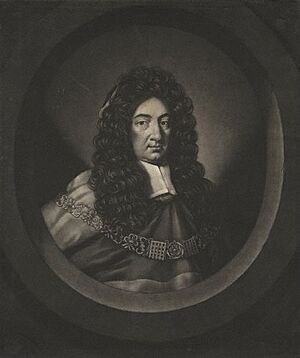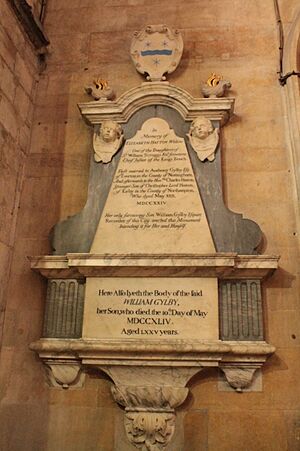William Scroggs facts for kids
Sir William Scroggs (born around 1623, died October 25, 1683) was a very important judge in England. He held the top legal job, called the Lord Chief Justice of England, from 1678 to 1681. He is mostly known for leading the trials during a time called the Popish Plot. During these trials, some people thought he was unfair to those accused.
Contents
Early Life and Becoming a Judge
William Scroggs grew up in Stifford, England. His father owned land in Oxford. William went to Oriel College and later Pembroke College, Oxford, finishing his studies in 1640. He was very good at learning about old history and literature.
Some people believe he fought for the King's side during the English Civil War. He was always loyal to the King. In 1653, he became a lawyer and quickly became successful in the courts.
In 1676, he was made a judge in the Common Pleas. Two years later, he was promoted to Lord Chief Justice. This happened because the Earl of Danby, who was the King's main helper, recommended him. Danby knew Scroggs was a good lawyer and a strong supporter of the King.
Scroggs's Views on Catholics
Scroggs was known for strongly disliking Catholic priests. He often spoke out against them in public. However, he was much less harsh towards regular Catholic people. Even during the time of the Popish Plot in 1678, he said that many honest Catholic gentlemen in England would never plot against the King.
Catholic people who gave evidence in the trials were usually treated with more respect than priests. For example, at the trial of Sir George Wakeman, a woman named Ellen Rigby was treated very politely by Scroggs.
Lord Chief Justice and the Popish Plot
As Lord Chief Justice, Scroggs led the trials of people accused in the "Popish Plot." This plot was a made-up story by people like Titus Oates and other informers. Many people in England, including Parliament, believed the plot was real.
Scroggs seemed to believe the plot was real at first. However, he did not always check if the witnesses, like Oates, William Bedloe, and Thomas Dangerfield, were telling the truth. He knew that Bedloe and Dangerfield were involved in criminal activities. Another informer, Stephen Dugdale, was seen as more believable by many, including Scroggs.
Scroggs Changes His Mind
Things changed in July 1679. Titus Oates accused the Queen's doctor, Sir George Wakeman, of being part of the plot. This accusation could have also involved the Queen herself. At this point, Scroggs started to think the accusations were going too far. He also realized that the King's court did not believe the plot was real.
During Wakeman's trial, Scroggs openly questioned if Oates and Bedloe were trustworthy witnesses. He told the jury to be very careful about believing their evidence. Because of this, Wakeman and three priests, including Maurus Corker, were found not guilty. This was the first time Scroggs suggested that a Catholic priest might be innocent of anything other than just being a priest. Being a priest was against the law at the time, but Corker and the others were not put to death. They were released after some time in jail.
This decision made many people angry at Scroggs, because most people still strongly believed in the plot. He was accused of taking money from the Portuguese Ambassador to help Wakeman be found innocent.
In August 1679, the King became very ill. Scroggs was worried about his own future. When he saw the King recovering, the King told him not to worry, saying, "we shall stand or fall together."
Scroggs continued to treat Catholic priests harshly in trials. For example, he sentenced Andrew Bromwich to death in 1679. However, Scroggs also asked for Bromwich to be shown mercy, and he was saved from death. A few months later, Scroggs showed he would not support those who wanted to prevent the King's brother, the Duke of York, from becoming King.
At the start of the new court term, Scroggs gave a speech about how judges should be independent. He said, "justice should flow like a mighty stream... neither for my part do I think we live in so corrupted an age that no man can with safety be just and follow his own conscience." This speech showed that Scroggs was more than just a "bully" as some people described him.
Last Years as a Judge
Oates and Bedloe tried to accuse Scroggs of misbehaving as a judge. They said he had discredited their evidence in the Wakeman case. In January 1680, Scroggs was found innocent by the King's special council. Scroggs again said that Oates was not believable, and the King fully supported him.
In June 1680, Scroggs led the trials of Elizabeth Cellier and Lord Castlemaine. Both were found innocent. Scroggs said that Dangerfield, another witness, was "a notorious villain." He even sent Dangerfield to prison.
In the same month, Scroggs dismissed a jury early to protect the Duke of York from being accused of being a Catholic. The House of Commons said this was illegal. Scroggs was later accused of wrongdoing by Parliament in January 1681. However, Parliament was dissolved, so the accusation ended.
The King now felt strong enough to let Scroggs go. In April, Scroggs was removed from his job, which surprised him. But he was given a good pension. He moved to his home in South Weald in Essex and also had a house in London. He died on October 25, 1683.
Family Life
Scroggs married Anne Fettyplace (who died in 1689). They had four children:
- Sir William Scroggs junior (died 1695), who also became a lawyer like his father.
- Mary (died 1675).
- Anne (died 1713), who married Sir Robert Wright. He also became Lord Chief Justice of England, but he died in prison.
- Elizabeth (died 1724), who married Anthony Gylby and later Charles Hatton.
Legal Writings
Scroggs wrote a book about how local courts worked, which was published after he died. He also helped edit the reports of the important trials he led.
See also
 | Audre Lorde |
 | John Berry Meachum |
 | Ferdinand Lee Barnett |



